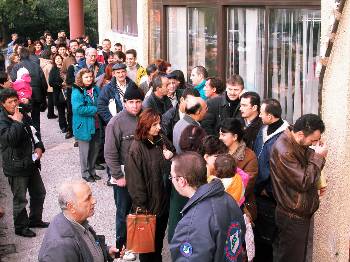
During his visit in Brussels, Kostas Karamanlis announced that he has taken and will continue taking decisions, which are “for everybody’s good” without being interested in the political scene, which will pay for it. Mr. Karamanlis agreed that business hours need to be more flexible, in order not to have any layoffs and admitted that Greece is on the road to recession.
The Prime Minister excluded the probability for increasing taxes of firms and banks, because it will be the wrong thing to do, when firms are facing bankruptcy and unemployment is increasing, to impose more taxes. When it comes to the banks – taxing their profits will harden the reversibility of the money on the market.
Journalists wanted Mr. Karamanlis to comment on the fact that in Northern Greece, firms have started using flexible business hours, so he said: “I agree that there should be stable work places. But I understand that in a time of crisis, extreme measures must be taken. If those measures do not violate the law, and are temporary, than this is better than shutting down companies.”
Almost one million people are in danger of losing their job in Greece and if this happens, it will have destructive consequences for the society. Meanwhile, the economic crisis in Europe is showing its bad sides and there is a danger to transform into a social crisis. Last week France was shaken by mass demonstrations and unemployment reached 2 million.
During December, unemployment in Greece was 8.9% but that is the official information. To it, we need to add the number of everybody, who has declared that they haven’t looked for a job during last week—in other words also unemployed, plus 2% of interns and another 2% of those who declare that they have worked at least one hour per week. This way, the total percentage of unemployed during December come up to 16.5%, which corresponds to 800 000 people.
Athens chamber of commerce chairman Mr. Konstatinos Mihalos used Mr. Karamanlis’ announcement about the application of a flexible time, as a safety raft and offered a three or four day business week, until the market reaches its normal rhythm.